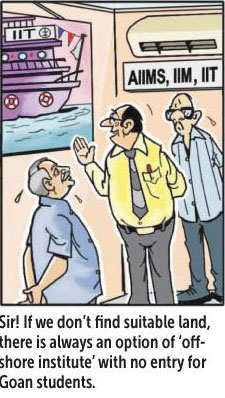23 Oct 2017 | 04:20am IST
Where there is Will there is a way
With Tax guru Prabhu Verlekar
Will is a very sensitive topic which is rarely discussed in Indian households. If husband raises this topic, wife thinks that he is indirectly telling that his end is near and a bad omen. Children will hesitate to open this topic, for fear being accused of eyeing parents’ properties and spoiling relationships. However, Goan catholic community is more practical and pragmatic in this respect, resulting in more Wills being registered at Sub-Registrar’s offices making way for smooth inheritance and clear titles.
Actually, a person who does not execute a Will is doing great damage to the family as children could fight for their shares. This has happened to great Ambani family inspite of their fabulous wealth. Ambani brothers fighting in legal battles was widely reported in National newspapers. We have also local example of a very astute and erudite prominent political leader of Goa, whose children are still fighting over the properties even when his 25th year Death Anniversary was being observed in Goa.
Many believe that this may not happen to them thinking that they have brought up their children with values and they will not fight; they are living in the world of fantasy. Some think that their dwelling house will automatically go to the spouse and investment to his nominees without legal consequences. If you think that by filling nomination forms, investments will pass on to nominees without any legal issues it is a misconception. Nominees are only trustees.
Laws of inheritance and succession are complicated and diverse in nature. In case a person dies intestate (without making a Will), his property will pass on to legal heirs as per their personal law under which they are governed viz, Indian Succession Act, Hindu Succession Act, Mohammedan Law, Portuguese Civil Code. For example, if a Hindu male dies leaving a dwelling house same will be inherited by all children and wife in equal shares.
In case you wish to leave property to your loyal domestic servant who has served you or to your close dependent relative or in charity to any organisation, Will is the only way. But better option is to make gift during your lifetime and see happiness on their faces.
A Will is a legal document which provides the manner in which a person’s property will be distributed after death. Person who makes the Will is called the Testator and persons who inherit the property under a Will are called Beneficiaries or Legatees. A person who makes Will should be major, of sound mind and free from improper influences. A Will can be revoked or altered by the Maker as often as he wishes. Will can to be executed on plain paper in one’s handwriting. However, typed Will is better to avoid any ambiguity. There is no stamp duty for the execution of Will. Though Will is not legally required to be executed before Court of Law or Sub-registrar, it is advisable to register the same, as many authorities insist on such registered Will for genuineness.
For executing a Will, the person should give his full description, address and declaration that he is in his full senses and from any kind of pressure. Then he should state name of his wife and children as the case may be. Thereafter he should record description of the properties - movable and immovable, and all investments he owns and how he is allotting them to each of the family members and beneficiaries. Do not forget about specifying person who shall have access to your passwords for demat, bank lockers and net-banking accounts. Specify name of person or persons who shall be Executors of the Will.
In case of Goans who are governed by Portuguese Civil Code under “Communion of Properties” each spouse has equal share in every property owned by the Communion. After death of any spouse, his/her fifty per cent share gets equally distributed between all children, whether male or female.
In such cases, separate Public Wills are required to be executed by each spouse before Office of the Civil Registrar- cum Sub- registrar and Notary Ex-Officio. The registered Will helps in transfer of properties after death to the legal heirs and beneficiaries specified in the Will in a smooth manner without requiring to pay stamp duty. Will serve for the purpose of Succession, Mutation and Partition.
Do not be under illusion that you will be able execute Will at ripe age choosing your own time. One can never know God’s Will. Prepare your Will today, not tomorrow, nor later in the interest of your loved ones.
There is no estate duty or death duty on the value of estate left by the deceased. There is also no income tax on the property or investments inherited by legal heirs.
